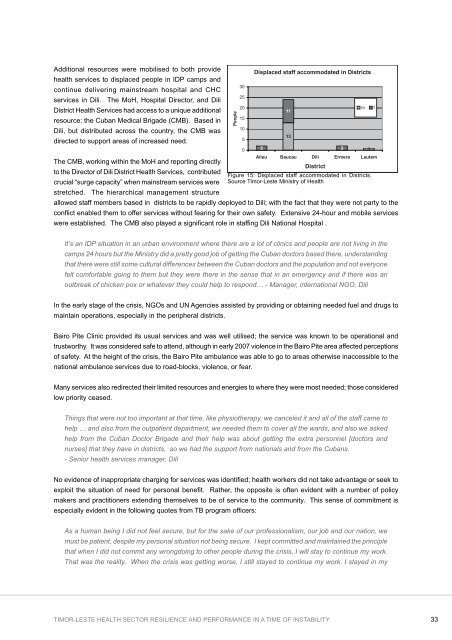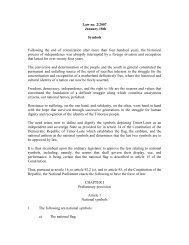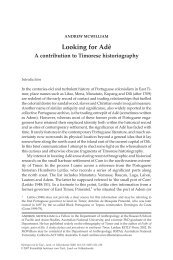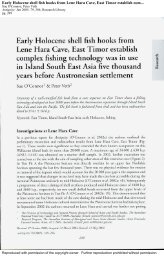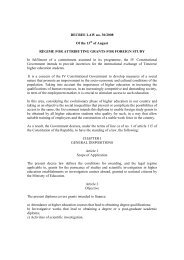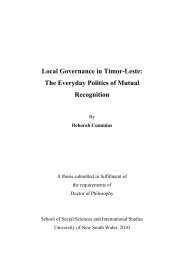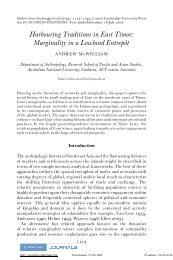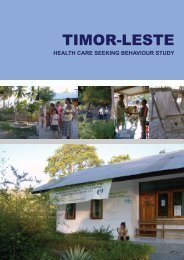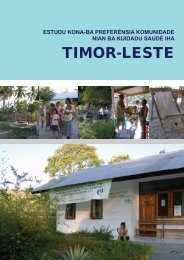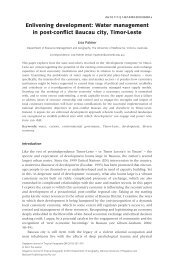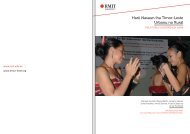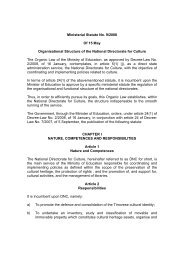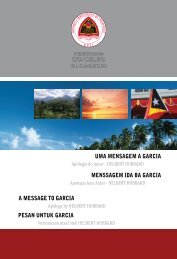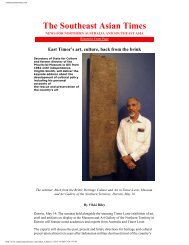Timor-Leste. Health Sector Resilience and Performance in a Time of ...
Timor-Leste. Health Sector Resilience and Performance in a Time of ...
Timor-Leste. Health Sector Resilience and Performance in a Time of ...
- No tags were found...
You also want an ePaper? Increase the reach of your titles
YUMPU automatically turns print PDFs into web optimized ePapers that Google loves.
Additional resources were mobilised to both providehealth services to displaced people <strong>in</strong> IDP camps <strong>and</strong>cont<strong>in</strong>ue deliver<strong>in</strong>g ma<strong>in</strong>stream hospital <strong>and</strong> CHCservices <strong>in</strong> Dili. The MoH, Hospital Director, <strong>and</strong> DiliDistrict <strong>Health</strong> Services had access to a unique additionalresource: the Cuban Medical Brigade (CMB). Based <strong>in</strong>Dili, but distributed across the country, the CMB wasdirected to support areas <strong>of</strong> <strong>in</strong>creased need.The CMB, work<strong>in</strong>g with<strong>in</strong> the MoH <strong>and</strong> report<strong>in</strong>g directlyto the Director <strong>of</strong> Dili District <strong>Health</strong> Services, contributedFigure 15: Displaced staff accommodated <strong>in</strong> Districts.crucial “surge capacity” when ma<strong>in</strong>stream services were Source <strong>Timor</strong>-<strong>Leste</strong> M<strong>in</strong>istry <strong>of</strong> <strong>Health</strong>stretched. The hierarchical management structureallowed staff members based <strong>in</strong> districts to be rapidly deployed to Dili; with the fact that they were not party to theconflict enabled them to <strong>of</strong>fer services without fear<strong>in</strong>g for their own safety. Extensive 24-hour <strong>and</strong> mobile serviceswere established. The CMB also played a significant role <strong>in</strong> staff<strong>in</strong>g Dili National Hospital .It’s an IDP situation <strong>in</strong> an urban environment where there are a lot <strong>of</strong> cl<strong>in</strong>ics <strong>and</strong> people are not liv<strong>in</strong>g <strong>in</strong> thecamps 24 hours but the M<strong>in</strong>istry did a pretty good job <strong>of</strong> gett<strong>in</strong>g the Cuban doctors based there, underst<strong>and</strong><strong>in</strong>gthat there were still some cultural differences between the Cuban doctors <strong>and</strong> the population <strong>and</strong> not everyonefelt comfortable go<strong>in</strong>g to them but they were there <strong>in</strong> the sense that <strong>in</strong> an emergency <strong>and</strong> if there was anoutbreak <strong>of</strong> chicken pox or whatever they could help to respond… - Manager, <strong>in</strong>ternational NGO, DiliIn the early stage <strong>of</strong> the crisis, NGOs <strong>and</strong> UN Agencies assisted by provid<strong>in</strong>g or obta<strong>in</strong><strong>in</strong>g needed fuel <strong>and</strong> drugs toma<strong>in</strong>ta<strong>in</strong> operations, especially <strong>in</strong> the peripheral districts.Bairo Pite Cl<strong>in</strong>ic provided its usual services <strong>and</strong> was well utilised; the service was known to be operational <strong>and</strong>trustworthy. It was considered safe to attend, although <strong>in</strong> early 2007 violence <strong>in</strong> the Bairo Pite area affected perceptions<strong>of</strong> safety. At the height <strong>of</strong> the crisis, the Bairo Pite ambulance was able to go to areas otherwise <strong>in</strong>accessible to thenational ambulance services due to road-blocks, violence, or fear.Many services also redirected their limited resources <strong>and</strong> energies to where they were most needed; those consideredlow priority ceased.Th<strong>in</strong>gs that were not too important at that time, like physiotherapy, we canceled it <strong>and</strong> all <strong>of</strong> the staff came tohelp … <strong>and</strong> also from the outpatient department, we needed them to cover all the wards, <strong>and</strong> also we askedhelp from the Cuban Doctor Brigade <strong>and</strong> their help was about gett<strong>in</strong>g the extra personnel [doctors <strong>and</strong>nurses] that they have <strong>in</strong> districts, so we had the support from nationals <strong>and</strong> from the Cubans.- Senior health services manager, DiliNo evidence <strong>of</strong> <strong>in</strong>appropriate charg<strong>in</strong>g for services was identified; health workers did not take advantage or seek toexploit the situation <strong>of</strong> need for personal benefit. Rather, the opposite is <strong>of</strong>ten evident with a number <strong>of</strong> policymakers <strong>and</strong> practitioners extend<strong>in</strong>g themselves to be <strong>of</strong> service to the community. This sense <strong>of</strong> commitment isespecially evident <strong>in</strong> the follow<strong>in</strong>g quotes from TB program <strong>of</strong>ficers:As a human be<strong>in</strong>g I did not feel secure, but for the sake <strong>of</strong> our pr<strong>of</strong>essionalism, our job <strong>and</strong> our nation, wemust be patient, despite my personal situation not be<strong>in</strong>g secure. I kept committed <strong>and</strong> ma<strong>in</strong>ta<strong>in</strong>ed the pr<strong>in</strong>ciplethat when I did not commit any wrongdo<strong>in</strong>g to other people dur<strong>in</strong>g the crisis, I will stay to cont<strong>in</strong>ue my work.That was the reality. When the crisis was gett<strong>in</strong>g worse, I still stayed to cont<strong>in</strong>ue my work. I stayed <strong>in</strong> myTIMOR-LESTE HEALTH SECTOR RESILIENCE AND PERFORMANCE IN A TIME OF INSTABILITY 33


